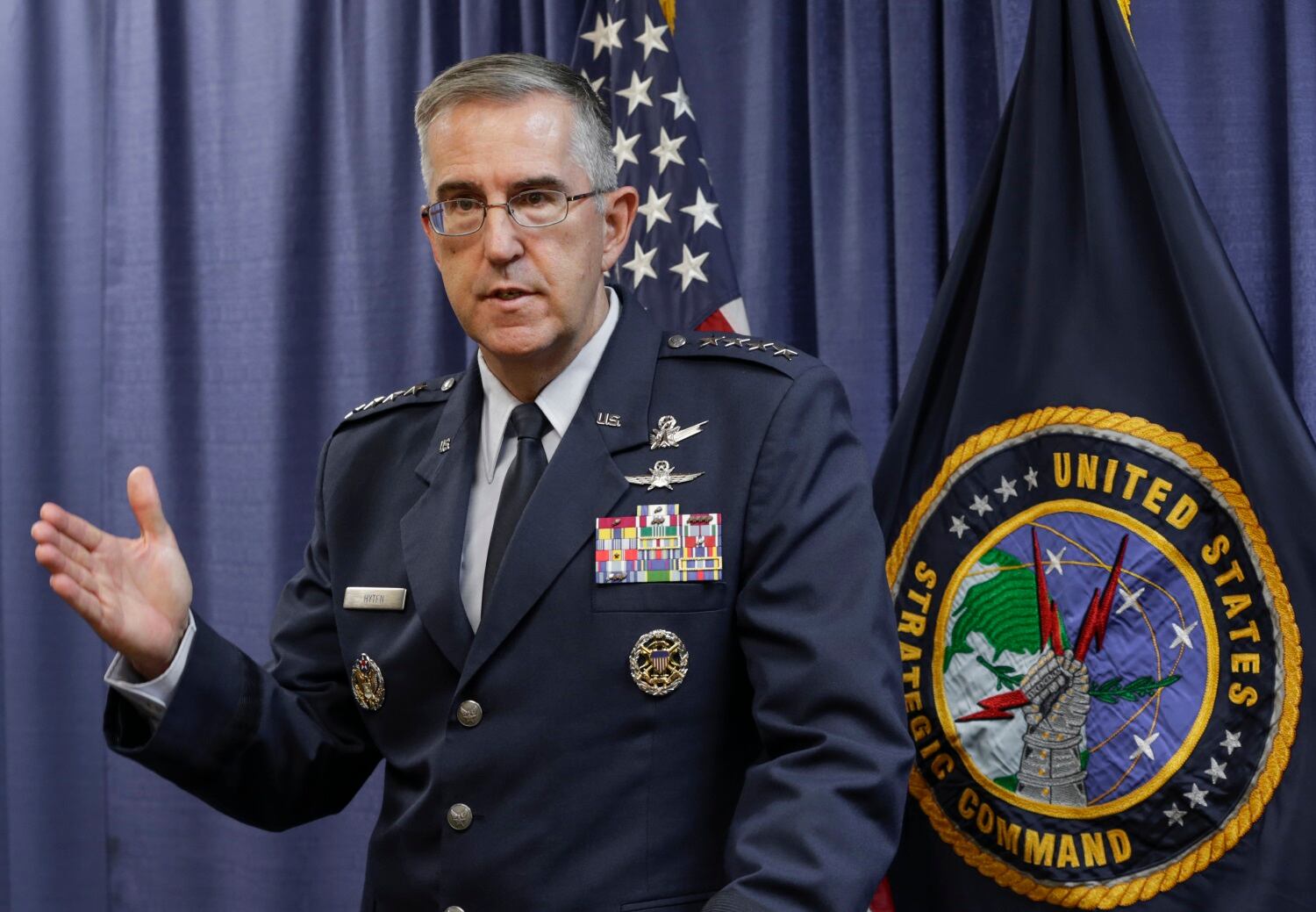Air Force Gen. John Hyten, the vice chairman of the Joint Chiefs of Staff, is about to retire after four decades in uniform, and the Defense Department is still trying to solve some of the problems it was trying to tackle when he first put on his second lieutenant bar.
Hyten is due to relinquish responsibility on Nov. 21, then officially retire, though President Joe Biden has not yet nominated a replacement. Like many before him, he laments the Pentagon’s deeply entrenched bureaucracy, he told reporters at a Defense Writers Group event on Thursday.
“After 40 years, I didn’t replace [the Space Defense Operations Center],” he said, despite tours as the head of Space Command and Strategic Command. “I worked on SPADOC the first time in 1986... that’s not a current weapon system. And there’s been better ways to do that mission for decades.”
To that end, he told Military Times, not being able to implement a resilient space architecture ― one that can recover quickly after an attack or some other break in functionality ― is his biggest regret about his time as the second-highest ranking officer in the military.
“We’ve talked about it for over a decade. And we’ve designed it for over a decade. And the design is out there,” Hyten said. “And because we haven’t [implemented it], we actually put the president in a tough spot,” with limited options if communications and weapons systems are down.
That slow progress has created a situation where U.S. capabilities are concentrated in a handful of locations and systems ― “fat, juicy targets,” he called them ― while an adversary like China has spread its capabilities out over hundreds of small targets.
“Even though our fat, juicy targets are so much more capable than theirs, they’re still fat, juicy targets. So we’ve actually encouraged the adversary to figure out how to kill fat juicy targets,” he said. “We shouldn’t have done that, and we could have done something different.”
Part of the Pentagon’s hesitancy, he said, is a philosophy in which nothing gets off the ground until everyone working on it is sure it’ll be a success.
He referenced a painting in the Pentagon that depicts the launch of Discovery 14, the first in a series of solar system exploration rockets to successfully launch. That the previous 13 were allowed to fail without the program being canceled entirely wouldn’t happen today.
Hyten pinpoints the 2000 Quadrennial Defense Review as the moment everything changed. That document proclaimed that the U.S. no longer had adversaries, and so would turn focus to development not to meet threats, but to increase capabilities for their own sake.
“When we did that, one of the implications was, since we’re so far ahead, we can remove all risk from the development process and make sure we only test when everything will work,” he said.
Because otherwise, he said, if a new system failed the first time ― which is generally to be expected, and sometimes is the goal, because you want to make something fail on purpose to see how far you can push it ― it would make headlines, get lawmakers’ attention and result in an investigation. And if if failed a second time, also generally to be expected, the program could be canceled altogether.
That’s what happened with the early days of DoD’s foray into hypersonic weapons, roughly a decade go.
“And then others start building hypersonics, others start testing, they start doing it the way we used to do it and they start moving fast,” Hyten said. “And so we start the programs again. And we still won’t test until we’re highly confident they’ll work.”
RELATED

In the most recent U.S. hypersonics test, he added, the system still failed, but it was because of the booster rocket, not the technology itself.
So then the development side of DoD has a choice to make: If you’re open about what you’re working on, you’re subject to intense scrutiny that could prematurely ax the effort. The best way to counteract that, Hyten said, is to classify programs.
But then, he added, you’re not having the deterrent effect you’d like to have on adversaries, because they can’t be dissuaded from provoking the U.S. by capabilities they don’t know about.
“So we’re gonna have to change the classification structure that we have,” Hyten said. “Not to declassify everything ― that’d be foolish ― but it’s so highly classified now that you can’t talk about it. And that’s a mistake.”
The main reason classification has become so rampant is to tamp down on leaks to China, he said. But the second-order effect is that when “you’re in the black, nobody’s checking your homework,” he added, so it means programs are free to have setbacks without risking cancelation.
“The only things I know that have gone fast last few years, across my programs, [are the ones] that I can’t talk about,” Hyten said.
And therefore, he said, the only things he knows of that have moved quickly recently are the ones that are classified.
“You can’t actually deter your adversary if everything you have is in the black,” he said.
And deterrence is the only way you give the U.S. a breather after 20 years of the Global War on Terror, which is now a fraction of its former self, though not nearly over.
“But I hope everybody knows that we don’t want war with Iran. We don’t want war with China. We don’t want war with Russia. We don’t want more with North Korea,” Hyten said. “We don’t want war. Actually, we’re tired of war. We don’t want to fight another war. We would like diplomacy to work.”
Instead, the hope is that the State Department will be able to manage relationships with adversaries such that weapons aren’t involved.
“We will maintain readiness to fall in on any problem that happens to folks we have overseas,” he said. “We will defend, and we’ll reserve the right to attack if we need to to defend ourselves. But we don’t want war.”
Meghann Myers is the Pentagon bureau chief at Military Times. She covers operations, policy, personnel, leadership and other issues affecting service members.




